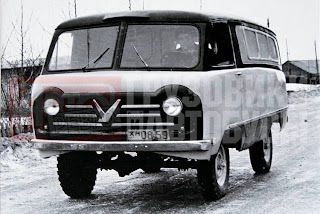On Sunday evening I saw Tania off on the Moscow train at eight, and headed home on foot. It’s about a 40 minute walk, and it takes in some of the best bits of Petrozavodsk. As you walk out of the station, you are confronted with a bizarre sight - someone decided it would be a good idea to build a miniature Big Ben in the middle of the square. It’s about 4 metres high and looks completely out of place, but never mind. At least they’ve resurfaced the road now, so that looks a bit better.
I then walked down the top part of Lenin Prospect, or, as everyone calls it “Lenina”. As is the case in a large percentage of Russian towns, Lenina is the main street in Petrozavodsk, running down the hill in a straight line from the station to the lake. I got as far as the university, which is an elegant but unremarkable Soviet structure, and turned right into Antekainena, a street name which reminds you that the region used to be inhabited by Finns. In a final (and ultimately vain) bid to stay in his job, the previous mayor launched a road building campaign this summer, which has improved the city’s dreadful roads quite considerably. Antekainena, however, remains among the city's worst. There is a traffic jam all day as cars slow to an almost dead stop as they negotiate the minefield of potholes and bumps. However, that didn’t bother me in the slightest as I wondered on towards Derzhavin’s park.
Autumn arrives early in the North, and the trees are already turning. As I enjoyed the cool evening air the crimson and golden leaves shone so brightly, although it was after sunset, that it seemed as though they were producing light themselves.
As you walk down through the park at twilight, you can’t help noticing the 'eternal flame' flickering just beyond the park boundary, on Lenin Square. Eternal flames are another ubiquitous feature of Russian cities - kept alight at all times in memory of the millions that died in WWII, or, as the Russians call it, the Great Patriotic War. It is a particularly pleasant place, with long rows of bright red flowers seemingly in constant bloom on either side of the flame, and a view down a steep bank into Governor’s Park and across to the factory which gave the city its name 300 years ago.
I then dropped down into the park, continuing to enjoy the leaves in the fading light, and remembering this time two years ago, when Tania and I first wandered along those paths together.
In the park the path joins the river, which is home to some of the world’s hardiest ducks. Throughout the winter the brave birds cling on to life in the tiny sections which are fast flowing enough to remain ice-free all year round. But they've got a few months before they need to worry about that! Indeed, winter still feels a long way off.
Wandering on down the river, I passed the municipal football pitch, which is in constant use. People even play on the snow in midwinter. After passing under a bridge, the river then runs into a small lake. But before doing so it splits, creating a little island which, for some reason, is home to the most striking trees of all. Connecting the island to the shore on both sides are pretty white bridges laden with padlocks left by lovers. Together, they create one of the prettiest landscapes in the city.
My walk then took me onto sand - it’s hardly the Costa del Sol, but the lakeside beach is a popular spot for sunbathing and beach volleyball in the summer. As I passed by some of the hardy ducks pushed out into the middle of the lake, leaving behind them perfect V-shapes on the glassy water.
As night finally started to squeeze out the last of the daylight I left the park and completed my journey home on the road, passing the faculty where I used to attend politics lectures, and the bus stop where I would wait every day (strangely I’m now living around the corner from the flat I lived in last time I was here). The faculty has been restored to its former glory, with a striking coat of bright red paint. It seems a little incongruous though, as all the other buildings in the area are faded, with the paint slowly peeling away. Although it’s a pleasant place to live, next to the Lake and not far from the city centre, it’s one of the less desirable parts of the city, and the houses are mostly very old - with many pre-dating the 1917 revolution.
After passing some of those sorry old houses, I turn into our ‘dvor’ - the communal area between blocks of flats. On the left is our local supermarket, and then a kindergarten, while our long, five floor block extends the length of the right hand side of the street.
Our block is a Khrushchovka - one of the hundreds of thousands of five floor houses built under Khrushchev to try and solve the Soviet Union’s terrible housing shortage. They were only meant to be temporary housing, but 50 years on, they are still standing and still very much inhabitable, even if they look a bit grim on the outside.
I arrived home in the dark, and had to feel my way to the light switch which, for some strange reason, you have to climb a flight of stairs to find. Now able to see where I was going, I found my way to our third floor flat, put our new kettle on (it glows blue and red… very exciting) and thought to myself that, as Russian cities go, Petrozavodsk is pretty alright…
_0315_-_Pussy_Riot5363.jpg)



















